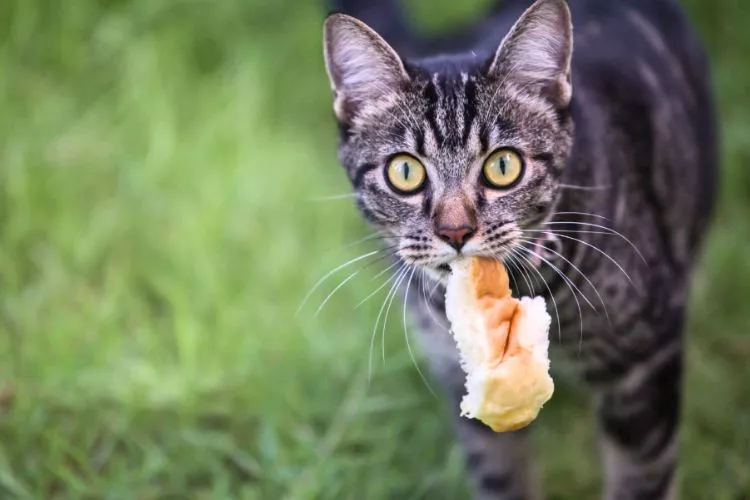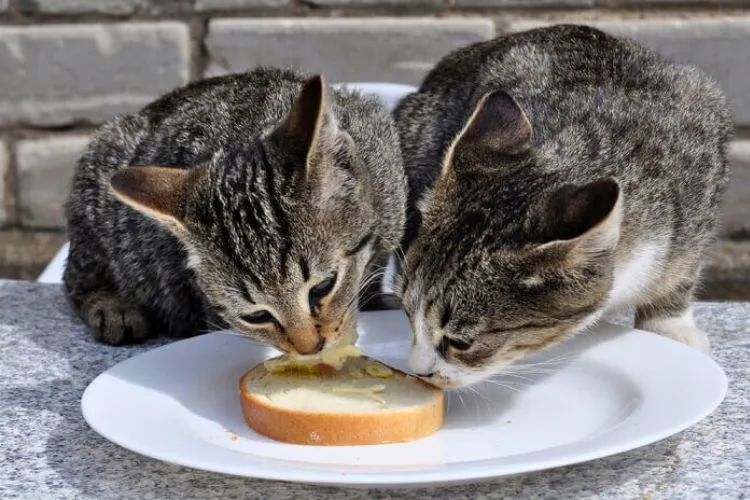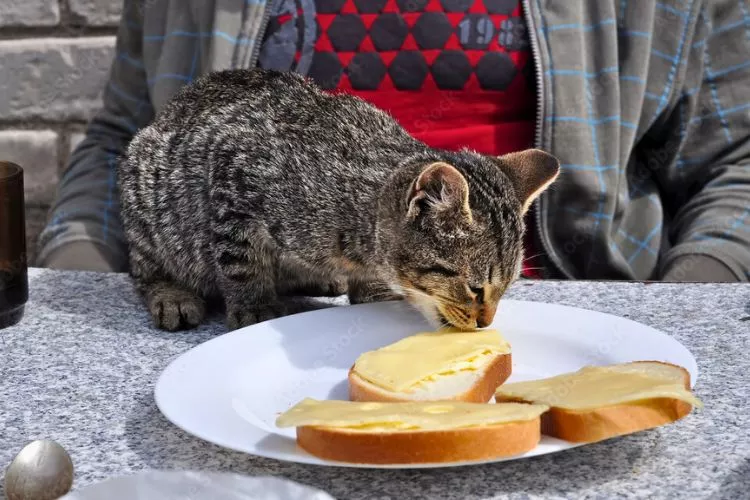Bread is a staple in many human diets worldwide, but have you ever wondered whether it’s suitable for our feline friends?
I mean, can cats have bread?
Well, as a cat owner, you must know the food you can safely share with your fur babies. That’s why we will try to decode whether bread is safe to eat for cats or not in the form of this article.

With insights from veterinarians and feline dietary experts, we aim to provide readers with an informative and comprehensive understanding of whether or not bread is a suitable snack for your beloved feline companion.
🐾 Can cats have bread?
Cats can have bread in small quantities, but it is not an ideal or necessary addition to their diet.
Cats are obligate carnivores, which means their primary nutritional needs come from animal-derived sources.
While bread is not toxic to cats, it lacks the essential nutrients their bodies require, like taurine and protein.
An occasional small piece of plain bread as a treat is generally safe, but be cautious with flavored bread or those containing ingredients harmful to cats, such as garlic, onions, or raisins.
Regularly feeding your cat bread can lead to obesity and nutritional imbalances. Sticking to a balanced, high-quality cat food and consulting with your veterinarian for any specific dietary concerns or changes is best.
🐾 Can kittens eat bread?
Kittens can eat bread, but it is not recommended due to their specific dietary needs as they grow and develop.
As obligate carnivores, kittens require a diet primarily based on animal-derived nutrients, and bread does not provide the essential nutrients they need for proper growth and development.
Plain bread in a small amount occasionally might not cause any harm to kittens; however, considering the lack of nutritional value, it is best to avoid offering bread to kittens.
Instead, it is advisable to provide kitten-specific food that meets their nutritional requirements and consult a veterinarian for detailed dietary advice.
🐾 What happens if a cat eats a piece of bread?
If a cat eats a small piece of bread, it generally won’t face significant adverse effects as baked bread in small amounts is considered safe for cats.
However, excessive bread consumption can lead to obesity and nutritional imbalances because bread is an inadequate source of nutrients for cats.

Bread does not contain enough nutrients for a healthy cat diet, leading to a cat potentially being filled up without receiving the crucial nutrients it needs.
Sometimes, bread might not agree with a cat’s stomach and could cause gastrointestinal distress, diarrhea, or vomiting.
It is important to avoid flavored bread or those containing ingredients harmful to cats, such as garlic, onions, or raisins.
🐾 My cat ate a loaf of bread: What to do?
If your cat ate a loaf of bread, there’s no need to panic since bread is non-toxic to cats.
However, bread isn’t particularly beneficial for them and shouldn’t be considered a meal replacement or a regular treat. Bread is high in calories but not high in nutrients.
If your cat has consumed a large amount of bread, it is advised to call your vet for further guidance. Keep an eye on your cat for any signs of discomfort or changes in behavior.
Remember, bread should only be given to cats in small amounts occasionally, like when you have to help them swallow a pill.
🐾 What kind of bread can cats eat?
Cats can eat small amounts of plain bread made from white, rye, or wheat flour, typically considered safe for occasional consumption.
However, flavored bread or potentially harmful cat ingredients, such as garlic, onions, or raisins, should be avoided.
It is crucial to remember that bread should not be a regular part of a cat’s diet and should only be offered as an occasional treat, as cats are obligate carnivores and require a diet primarily based on animal-derived nutrients.
Therefore, while certain types of bread may be safe for cats, it is best to stick to high-quality cat food and consult your veterinarian for specific dietary concerns.
🐾 Can cats have butter?
Yes, cats can have butter, but it’s not exactly healthy for them. Butter is high in fat and calories and doesn’t provide the necessary nutrients that cats need in their diet.
While butter isn’t poisonous or toxic to a cat, the problem with cats eating butter is mainly malnutrition, not lactose intolerance or hairballs.

It’s important to remember that cats are obligate carnivores and should primarily consume animal-based food sources.
If your cat consumes some butter, they are unlikely to get sick or die. However, it is not recommended to feed them butter regularly, as it does not contribute to a balanced diet.
🐾 The Digestive Impact of Bread on Cats
While bread itself isn’t toxic to cats, it doesn’t necessarily sit well with their digestive systems. Cats have short digestive tracts designed to process animal protein and fats, not carbohydrates like those found in bread.
Consuming bread, especially in large amounts, can lead to gastrointestinal upset, including bloating, gas, constipation, and diarrhea. Some cats might experience discomfort if they consume bread frequently, so it’s essential to be cautious about giving bread to your feline companion.
🐾 The Role of Carbohydrates in a Cat’s Diet
Unlike dogs, cats are obligate carnivores, meaning their diets should be primarily animal-based. Carbohydrates like those found in bread provide minimal nutritional value to cats. A cat’s body is better suited to metabolize protein and fats for energy, not carbs.
While small amounts of carbohydrates might not cause significant harm, their inclusion in the diet of a cat is not recommended. The bulk of a cat’s diet should consist of high-protein, high-fat foods that mimic what they would consume in the wild.
🐾 Alternatives to Bread for Treats
If you’re looking for healthy, cat-friendly treats to give your pet, there are plenty of better options than bread. Cooked meats like plain, boiled chicken, turkey, or small pieces of tuna (without added salt or seasoning) are high in protein and provide essential nutrients that cats need.
You could also offer small amounts of freeze-dried fish, such as salmon or sardines, as an occasional treat. These options are more suitable and align with a cat’s natural diet.
🐾 Bread and the Risk of Allergies in Cats
Just like humans, cats can develop food allergies, including sensitivity to ingredients in bread, such as gluten or yeast. Symptoms of food allergies in cats can include skin irritations, excessive itching, redness, hair loss, vomiting, diarrhea, or gastrointestinal distress.
If your cat exhibits any of these signs after consuming bread, it’s best to remove it from their diet and consult your vet to explore alternative food options and address any food-related issues.
🐾 The Nutritional Imbalance of Bread in Cats’ Diets
While cats can technically eat small amounts of bread without adverse effects, it’s not a suitable substitute for their primary food source. Bread lacks essential nutrients like taurine, protein, vitamins, and minerals that cats need for overall health.
A cat’s diet should be rich in these nutrients, found in high-quality cat food formulated to meet their dietary needs. Providing a well-balanced diet focused on animal-based proteins, healthy fats, and essential amino acids is crucial for maintaining a cat’s overall health and preventing nutritional deficiencies.
Conclusion :
While cats can technically consume bread without immediate harm, but it does not provide the necessary nutrients for their overall health and well-being.
As obligate carnivores, cats depend on animal proteins and fats for their dietary needs.
Thus, bread should not be considered a substitute for their normal diet.
Occasional small quantities of bread may be acceptable as a treat or to help administer medication, but it shouldn’t become a regular part of their diet.
To ensure your feline friend stays healthy, always opt for cat-specific nutrition and consult your veterinarian for proper guidance on maintaining a balanced and appropriate diet.
